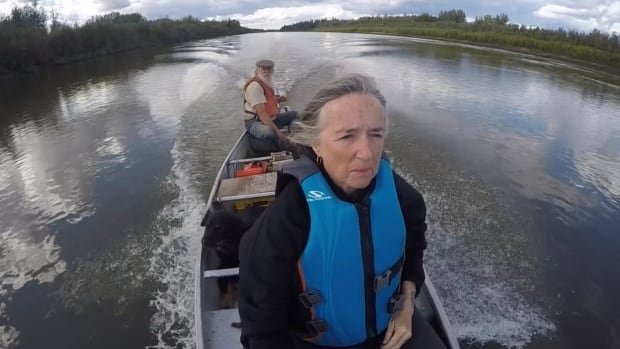
A northern Alberta senior thought she was going into cardiac arrest. The medevac cost her $29K
There is no grocery store, post office or doctor’s office in remote Fitzgerald, Alta.
The northern community is more than 700 kilometres northeast of Edmonton on the Slave River, near Wood Buffalo National Park. The only year-round road out of Fitzgerald links it to the Northwest Territories.
The closest town with services and health care is Fort Smith, located just across the border in N.W.T., about 25 kilometres to the northwest.
Beverly Tupper, a 78-year-old Fitzgerald resident, recently learned that while an Alberta health care card covers doctor visits in N.W.T., it doesn’t cover everything.
In September 2023, Tupper went to the health centre in Fort Smith with an atrial flutter. Her heart was beating at more than 200 beats per minute.
As a former public nurse, she knew it could eventually lead to cardiac arrest.
“It was really frightening,” said Tupper, who was a guest on CBC’s Radio Active Health Care Checkup earlier this month.
She was sent to Edmonton on a medevac flight — a trip that would cost her $29,000.

Due to wildfires, many northern communities were evacuated at the time Tupper got a medevac, including Fitzgerald.
“There were no physicians in Fort Smith, because they all had been evacuated,” she said.
Not covered
A statement from the office of Alberta Health Minister Adriana LaGrange said that while Alberta has reciprocal billing agreements with other provinces to cover necessary hospital and physician services, ambulances and medevacs from other provinces or territories to Alberta are not covered.
That type of coverage is not a requirement under the Canada Health Act, the statement said. It added that no other provinces or territories fund air ambulance services across borders.
The province recommends people purchase travel medical insurance if they have plans to travel outside Alberta.
But that doesn’t make sense for people who need to cross a provincial border to access basic services, Tupper said.
“I’m not travelling. I’m just doing my day-to-day things, like get gas and check the mail.”
Tupper has not paid her $29,000 bill. She says she can’t afford to pay it.
She has tried reaching out for help to the Alberta and N.W.T. ministers of health, the federal health minister, her MLA and her MP, but has been told the medevac bill is her responsibility.
She has since has looked into getting year-round medical travel insurance.
However, since she is in her late 70s and has a pre-existing health condition, available plans would cost her $24,000 a year, “which I can’t afford,” she said.
Tupper does pay for additional private ambulance coverage, but learned it would not cover her medevac bill.
Alberta and N.W.T. should come to an agreement for residents who live near a border and get health care from another province or territory, she said.
In the last year, 127 people in N.W.T. who were not from the territory were billed after requiring medevacs. That’s a significant increase from 2016, when CBC reported there were 45 such cases.
Tupper received her medevac bill from the Northwest Territories Health and Social Services Authority.
In a statement, the authority said due to the nature of the N.W.T.’s geography, if someone has a health-care emergency, it often requires significant resources, such as a fixed-wing aircraft.
In 2023, Alberta provided medevac services to 138 people who didn’t have Alberta health-care coverage.
Although the Canada Health Act is supposed to ensure that access to publicly funded health services is available to everyone, everywhere, that isn’t always the case.
“Despite there being this principle of accessibility in the act, it is at times and in certain circumstances, rather aspirational,” said Lorian Hardcastle, an associate professor in the faculty of law and Cumming School of Medicine at the University of Calgary.
While there is a large focus on challenges hospitals are facing in urban centres, other issues are being left behind, such as rural access to health care, Hardcastle said.
“I think one thing that can be quite surprising to people when it comes to the Canada Health Act is that it doesn’t always cover exactly the same level of health care from province to province,” she said.
Flown to Edmonton
After she was transported to the Royal Alexandra Hospital in September 2023, Tupper spent five weeks in the Edmonton area, recovering and getting treatment for her irregular heart beat. She was not able to return home due to a massive out-of-control wildfire.
Six times that first week, her heartbeat increased to over 200 beats per minute. When it happened, Tupper went to emergency, where wait times could be up to eight hours.
Radio Active7:30$29,000 medical bill
In summer 2023, Beverly Tupper had to be airlifted from Fort Smith to Edmonton. Later, she was billed for the flight. The bill she recieved was for $29,000. She joins us to talk about the issue.
Sometimes, she could bring down her own heart rate by sticking a syringe into a nerve that leads to her heart and “blowing as hard as I could.”
Another trick was plunging her face into a bowl of ice water.
To fix the atrial flutter, Tupper had cardiac ablation treatments in Red Deer. The treatment uses catheters to create tiny scars in the heart that block faulty signals and restore a typical heartbeat.
Although she has since recovered and stays active gardening and keeping chickens, Tupper said she is getting to an age where her body is starting to break down.
In 2013, she had open-heart surgery to remove a tumour. She looked into getting home care afterward but wasn’t able to get it in her remote northern community.
“I’ve had to learn to look after myself pretty well.”